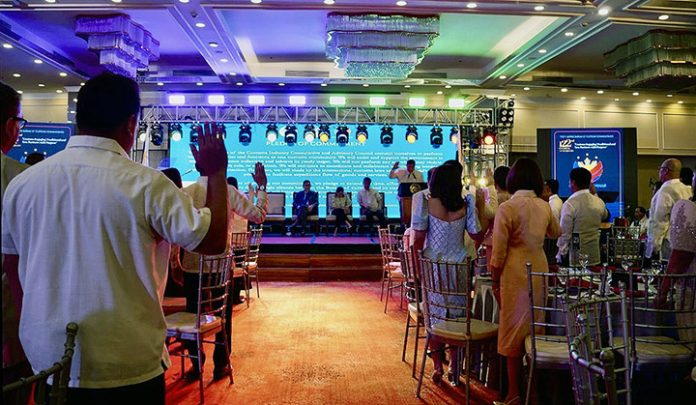-
The Bureau of Customs officially launched the Customs Industry Consultative Council
-
The body enlists the participation of the private sector in advancing the bureau’s reform agenda
-
Representatives from business and trade organizations and associations took a pledge of commitment as CICAC members
-
Customs commissioner Bienvenido Rubio said active participation of CICAC members is crucial in ensuring stakeholders are well-presented in every BOC decision-making process
-
The CICACs will be established in the BOC central office and all its collection districts
The Bureau of Customs (BOC) officially launched its Customs Industry Consultative Council (CICAC), a consultative body with industry groups to enlist their support and active participation in advancing the reform agenda of the bureau.
Launched during BOC’s 122nd founding anniversary celebration on February 13, the CICAC will also help in addressing existing and potential issues related to Customs and industry matters.
Representatives from business and trade organizations and associations that were approved as members of CICAC took a pledge of commitment to perform their duties and functions as part of the council.
“Your ready support and active participation will be very crucial in ensuring that our stakeholders are well-presented in every decision-making process we will undertake,” Customs Commissioner Bienvenido Rubio said during the launch.
Created under Customs Memorandum Order (CMO) No. 02-2024, CICAC will help in promoting mutual understanding, and strengthen the harmonious relationship between BOC and its industry partners.
READ: BOC to create multi-industry advisory groups
The CICACs will be established in the BOC’s central office and all of its collection districts, and will be composed of the “most trusted, honest, and compliant companies and trade organizations/associations operating in the country.”
The industry groups that will participate in the CICAC must have the approval of the Customs commissioner.
The central CICAC will be chaired by the Customs commissioner and composed of BOC officials from the central office and the heads/representatives of business and trade associations, organizations, and companies directly dealing with the BOC.
Each collection district will establish their own CICAC chaired by the district collector and composed of BOC officials and personnel from the collection district, as well as representatives of business and trade associations, organizations, and companies directly dealing with BOC.
The business and trade associations approved by the Customs commissioner include, but are not limited to, the Philippine Chamber of Commerce and Industry; Chamber of Customs Brokers, Inc.; Federation of Filipino-Chinese Chamber of Commerce and Industry; Association of International Shipping Lines; Airline Operators Council; Philippine Retailers Association; Distilled Spirits Association of the Philippines; Common Bonded Warehouse Operators, Inc.; Confederation of Truckers Association of the Philippines; Philippine Chamber of Arrastre and Stevedoring Operators, Inc.; Port Users Confederation; Foreign Buyers Association of the Philippines; Federation of Philippine Industries; Philippine Association of Meat Processors, Inc.; Philippine Chamber of Agriculture and Food Inc.; Philippine Exporters Confederation, Inc.; and the top 20 importing companies of the Philippines and other relevant businesses and trade associations.
The CICAC’s functions include conducting regular consultative meetings and dialogues to discuss trade environment trends and updates, apprise industry partners about Customs policies and programs, and address issues and concerns relating to their implementation.
The council will also establish a mechanism for consultation prior to and after the implementation of new policies to improve regulatory compliance among stakeholders and provide policy feedback to the BOC.
The CICAC will recommend policies, actions, and solutions to prevent illicit activities of traders and Customs employees and help secure trade supply chains.
The council will also aid in the identification of Customs procedures and methods that are no longer aligned with modern business standards and initiate the adoption of state-of-the-art technology that will enable the BOC to effectively adapt to the requirements of a fast-changing trade environment.
The CICAC will likewise help develop a program to incentivize stakeholders for outstanding compliance with Customs rules and regulations, and participate in the corruption risk analysis to strengthen the BOC’s code of conduct and encourage the development of a code of conduct for the private sector.
The district CICACs will recommend agendas for discussion of the central CICAC, if deemed necessary for policy consideration by the BOC.
Aside from CICAC, the BOC in 2019 formed a Multi-Sector Governance Council composed of sectoral leaders and representatives to provide expert advice to the bureau towards achieving a customs administration at par with global standards.





